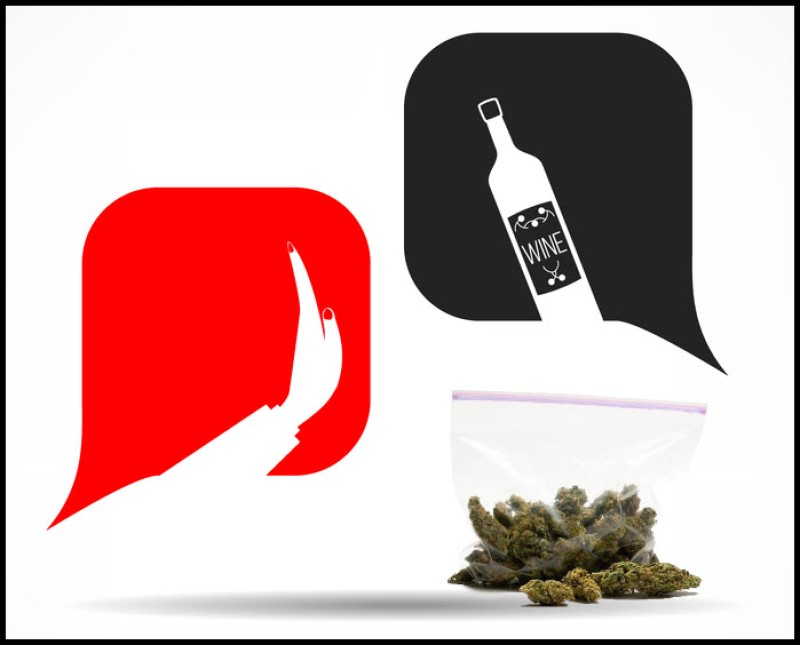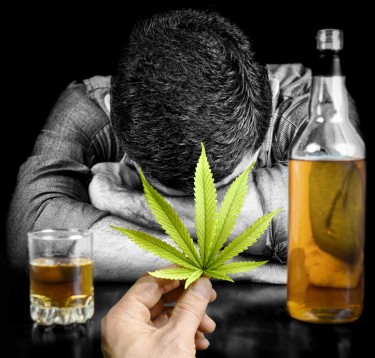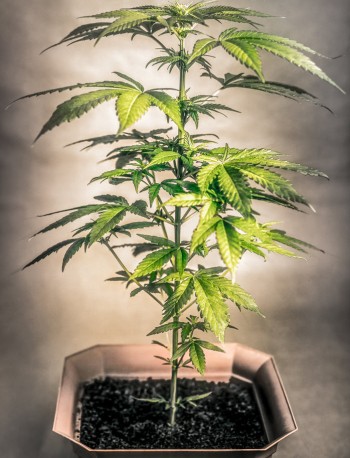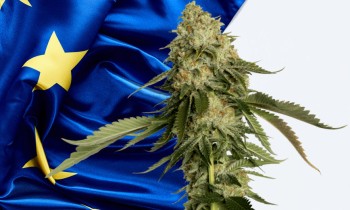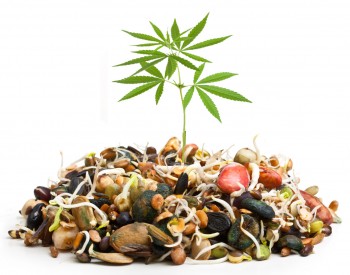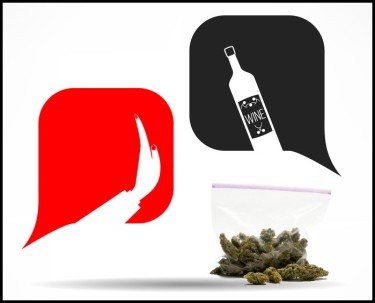
Why is AA demonizing cannabis use and how the founder actually kick his addiction?
Today there are roughly 85.6% of Americans aged 18 and older who admit that they have drank alcohol at least once in their lifetime according to the NIH. Roughly 70% said they drank alcohol during the past 12 months and roughly 54% claimed they drank alcohol the past week.
Considering that the US population is sitting somewhere at the 335 million marker. Now that’s a lot of booze!
However, when it comes to binge drinking and alcoholism, the numbers are slightly less. Nonetheless, considering the population of the US – we’re still talking about millions of people. Here’s a direct quote from the NIH on these statistics relating to binge drinking & heavy alcohol use;
In 2019, 25.8 percent of people ages 18 and older (29.7 percent of men in this age group and 22.2 percent of women in this age group4) reported that they engaged in binge drinking in the past month,4 and 6.3 percent (8.3 percent of men in this age group and 4.5 percent of women in this age group5) reported that they engaged in heavy alcohol use in the past month – NIH
Binge drinking however, isn’t necessarily alcoholism. It simply means that the people who drink more than 4-5 drinks in a period of 4 hours. In other words, if you’re drinking to get drunk or are at a party and have more than 5 drinks, you would fall under this category.
Now, when we look at “Alcohol Use Disorder” the numbers shrink even more. Here’s another snippet from the NIH;
According to the 2019 NSDUH, 14.5 million (nearly 15 million) people ages 12 and older7 (5.3 percent of this age group8) had AUD. This number includes 9.0 million men7 (6.8 percent of men in this age group8) and 5.5 million women7 (3.9 percent of women in this age group8) - NIH
Yes – you read that correctly. The statistics on AUD starts from the age of 12! It’s kind of a shock when you think about how hard regulators are trying to “curb cannabis use among the youth” but don’t have the same zeal for getting alcohol out of the hands of twelve year olds. We also don’t see the weekly reefer madness style articles appear in every mainstream news source to demonize its use.
Rather, alcohol is celebrated on morning talk shows, blasted on television during national sports events and touted as a “sophisticated way of getting fucked up!”
The reason why I preface this article with all of these alcohol stats is because when you compare them to cannabis, the “threat of cannabis” is completely overblown. However, this also isn’t the purpose of the article.
Rather, I wanted to point out how prevalent alcohol addiction is and when someone is an alcoholic, we been taught by Hollywood that Alcoholic Anonymous is the way to go to kick the addiction. Accept, when you take a look at A.A’s success ratings…maybe we’re being lied to?
How good is AA at kicking alcoholism?
Alcoholics Anonymous was founded in 1935 and since then the 12-step program has been pushed as the mainstream way of “kicking the demon”. In fact, the program has morphed to entail “other” drugs too. What’s more important is that A.A became the way for courts to make addiction “not their problem”. In fact, most times when there is someone who broke the law while under the influence of alcohol – the judge would mandate A.A sessions in order to avoid jail.
What this means is that there is a great percentage of people in the program that really don’t want to quit alcohol, but rather want to avoid jail.
In fact, the rehabilitation industry is worth billions annually for this fact.
Dr. Lance Dodes in an interview with NPR spoke about the “bad science” behind A.A in his book, “The Sober Truth: Debunking the Bad Science Behind 12-Step Programs and the Rehab Industry”
Here’s a snippet from his interview with NPR in 2014 in relation to the success rates of A.A which stands at a feeble 5% - 10%.
There is a large body of evidence now looking at AA success rate, and the success rate of AA is between 5 and 10 percent. Most people don't seem to know that because it's not widely publicized. ... There are some studies that have claimed to show scientifically that AA is useful. These studies are riddled with scientific errors and they say no more than what we knew to begin with, which is that AA has probably the worst success rate in all of medicine.
It's not only that AA has a 5 to 10 percent success rate; if it was successful and was neutral the rest of the time, we'd say OK. But it's harmful to the 90 percent who don't do well. And it's harmful for several important reasons. One of them is that everyone believes that AA is the right treatment. AA is never wrong, according to AA. If you fail in AA, it's you that's failed. – (SOURCE: NPR)
This isn’t to say that A.A doesn’t do anything. 5-10% success rate still means that there are thousands of people who do benefit from the program. However, when the vast majority of the people in the program DO NOT benefit from it, and in turn, feel like “they” are the problem – then it’s probably time we begin to re-evaluate how to approach addiction around the world in general.
In fact, Dodes continues to explain why the 5% - 10% actually do kick their addictions;
The reason that the 5 to 10 percent do well in AA actually doesn't have to do with the 12 steps themselves; it has to do with the camaraderie. It's a supportive organization with people who are on the whole kind to you, and it gives you a structure. Some people can make a lot of use of that. And to its credit, AA describes itself as a brotherhood rather than a treatment. (SOURCE: NPR)
This actually resonates with the Rat Park study conducted by Dr Bruce Alexander in the 1970s where they created different scenarios with rats to test whether the “substance” plays a larger role in addiction, or whether there are other factors.
The Psychiatric Times explains;
Researchers had already proved that when rats were placed in a cage, all alone, with no other community of rats, and offered two water bottles-one filled with water and the other with heroin or cocaine-the rats would repetitively drink from the drug-laced bottles until they all overdosed and died. Like pigeons pressing a pleasure lever, they were relentless, until their bodies and brains were overcome, and they died.
But Alexander wondered: is this about the drug or might it be related to the setting they were in? To test his hypothesis, he put rats in “rat parks,” where they were among others and free to roam and play, to socialize and to have sex. And they were given the same access to the same two types of drug laced bottles. When inhabiting a “rat park,” they remarkably preferred the plain water. Even when they did imbibe from the drug-filled bottle, they did so intermittently, not obsessively, and never overdosed. A social community beat the power of drugs. (SOURCE: Psychiatric Times)
In other words, when the rats were isolated and caged in solitary confinement – they abused heroin until they died. Whereas, when they had the liberty to interact with their fellow rats in a freer environment – they still imbibed heroin-filled water, but none of them abused it till the point of overdose.
This suggests that “comradery”, structure, and community, plays a vital role in kicking addiction. However, alcohol addiction isn’t like other addictions and you can actually die if you stop drinking all of a sudden – especially if you’re a heavy alcoholic.
According to Healthline – “Alcohol is a depressant of the central nervous system (CNS). This means it has a slowing effect on the brain.
With continued exposure, the body adapts to alcohol’s depressant effect. When you reduce or stop drinking alcohol, the CNS becomes overexcited. This can lead to the symptoms of withdrawal.” (Source: Healthline)
Of these withdrawals, the truly life threatening ones are;
-
Withdrawal Seizures
-
Status Epilepticus
-
Delirium tremens which can happen 2-3 days after stopping to drink
When there is some form of treatment, the cases of death is rare…however, there is a possibility nonetheless. Now it’s important to note that the main reason why people experience “death” as a result of alcohol withdrawal is due to the Central Nervous System going into overdrive due to the compensation of the lack of alcohol (which is a depressant).
This is where cannabis can actually come in quite handy.
How Cannabis can help with Alcohol withdrawal
Understanding that alcohol withdrawal is a result of an “excited central nervous system” due to the lack of ethanol in the system, we need to take a look at how cannabis affects the central nervous system.
More importantly, cannabis has “anti-seizure” capabilities which are the side effects of alcohol withdrawal.
For people with epilepsy or other seizure disorders, marijuana use has helped reduce the frequency and intensity of their seizures. A study conducted in 2017 provides evidence that CBD improved seizure control in patients with epilepsy, and in a 2016 study, researchers determined that THC helped reduce the pain, spasms and spasticity of seizures in patients with multiple sclerosis.
In 2018, the United States Food and Drug Administration (FDA) approved a CBD-based oral medication for the treatment of seizures in two forms of epilepsy. This medication, Epidiolex, is the first drug to be approved by the FDA that contains CBD. The approval of Epidiolex cements marijuana’s beneficial effect on seizures, and it marks a significant change in the national perspective regarding marijuana as medicine. (SOURCE: MarijuanaDoctors)
Of course, we cannot correlate one with the other, but the fact that cannabis, and more specifically CBD has a direct impact on seizure disorders, which is linked with the central nervous system. Some go as far as calling it a “central nervous system disease”.
Therefore, one can assume that when alcohol-withdrawals occur and manifest in a seizure, it’s due to an overactive nervous system. CBD and THC both help regulate the central nervous system via the endocannabinoid system. Furthermore, cannabis can also help with cravings as was discovered by Dr. Mikuriya in the 1970s, when she successfully help treat a 49-year old female alcoholic wean off alcohol using marijuana.
The earliest published account of cannabis substitution is a case study of a 49-year-old female alcoholic who found that with Antabuse and smoking cannabis helped her to quit drinking (Mikuriya, 1970). Within 5 months, the patient's physical and mental health markedly improved, and within 2 years, her liver and general health returned to normal. As her physician, Dr Mikuriya noted that although alcohol and cannabis differ greatly, they can both instill euphoria and detachment. But while alcohol seriously affected his patient physically and emotionally, cannabis did not produce the same negative consequences (Mikuriya, 1970). Mikuriya recommended clinical trials of cannabis among selected patients while cautioning that cannabis is not a panacea.
Mikuriya went on to lead two-additional cannabis substitution studies demonstrating cannabis' potential efficacy for both substitution and alleviation of alcohol-related harms. In a 2001 observational study, Mikuriya reviewed records from his medical practice and counted 104 patients who reported using cannabis to replace hazardous alcohol use. All of these patients claimed that cannabis relieved both craving for and symptoms masked by alcohol use (Mikuriya and Mandel, 2001). Most recently, another observational record review of 92 patients who substituted cannabis for alcohol showed that 100% reported cannabis as a very effective (50%) or effective (50%) substitute for alcohol. Ten percent of patients reported a year or more of alcohol abstinence and attributed their success to cannabis, while 21% reported return to unsafe drinking when stopping cannabis use (Mikuriya, 2004). (SOURCE: NIH Study)
Of course, this is only one study, and while there are more, this particular study had the most impact and only had a relapse rate of 21%. Compared to the A.A’s 90%-95% relapse rate, one would think that cannabis would become an integral part of the recovery process.
However, in A.A – this is not the case!
A.A and the Demonization of Cannabis
The real inspiration for writing this article came from an dry-alcoholic who posted in the subreddit “DryAlcoholics” about how the A.A demonizes cannabis.
I’ll keep it brief but this has bothered me for a long time and one of the reasons I stopped attending aa..they’re like “please confine your discussions to your problems with alcohol….unless of course it’s to shame someone for using cannabis” I understand for some people cannabis can trigger alcohol cravings, because of that i have never showed up to a meeting stoned. My cannabis habit costs me around 35 dollars a week which pales in comparison to what I used to spend on cigs and juul pods and red bull and coffee and takeout and whatever else to temporarily fill a void..there are people I know from meetings who end up with std’s from multiple one night stands or can’t look up from their phone for 2 minutes like everyone has vices why u gotta judge someone for recovering a different way than u did. People are way more likely to ‘keep coming back’ if they weren’t outwardly judged by a fellowship that claims to only have one requirement for membership. (Source: Reddit-DryAlcoholics)
While this is obviously anecdotal reporting, we can’t ignore these comments either. Addicts usually try to substitute their addiction with anything they can find. As the OP pointed out, some of them smoke tobacco, others try sex, and other get hooked on their phones. While you can medically be prescribed Benzodiazepine, these are also highly addictive drugs and in most cases, addicts will trade one addiction for another.
Furthermore, for many alcoholics, cannabis completely removes their cravings as this user notes;
“Weed completely removes my cravings. If I have one, I drink and I haven’t had one since I decided to lean into THC as a medicine to solve the worst problem I’ve ever had in my life.”
However, perhaps the most shocking revelation of the thread (and I do recommend reading the thread for anyone suffering from alcoholism) was that the founder of A.A actually did not kick his addiction via the 12-step program.
AA culture is bullshitery really...
Tell them the founder of AA Bill Wilson used LSD and attributed it to his sobriety.
They don't like hearing that bit of historical fact .
Weed is legal or decriminalized and 100% safer than alcohol or pharmacuticals .
They don't have proprietorship on sobriety like they think.
Weed isn't even mentioned in their Big Book
When I researched this, it was a shock to me!
Betty (Eisner) the LSD researcher and AA co-founder Bill Wilson. Betty was an associate of Dr. Sidney Cohen, who participated in at least two of the LSD sessions Bill experienced in the late 1950s at the Veterans Administration hospital in Los Angeles.
In an entry on “A Narrative Timeline for AA History”, found on Silkworth.net and dated August 29, 1956, we learn that “Bill W. joined with Aldous Huxley and took LSD in CA under the guidance of Gerald Heard and Sidney Cohen.”
Ernie Kurtz describes this first instance of Bill using LSD on the first page of an 1989 article, Drugs and the Spiritual: Bill Takes LSD, published by Lear magazine, which is archived on William White’s website:
His “doors of perception” cleared, colors glowed more intensely, the voice of Dr. Cohen reverberated with new resonance, all motion flowed with languorous beauty, and above all, he comprehended “the essential All-Rightness” of the universe… the reconciliation of opposites. (SOURCE: aaagnostica.org)
In other words, Bill had a “spiritual experience” which is fundamental in the “Big Book”. A.A believes in utilizing a “higher power” to help kick the addiction of alcoholism. Even Bill mentioned at some point that some people can’t experience this “spiritual awakening” as a result from their alcoholism – which typically is a depressant and severs the connection with the “spiritual”.
In these instances, he even advocated for LSD therapy in order to experience the “all-rightness” of the Universe. Re-establishing the connection with a sense of “something more” and allowing people to escape their mental prison of addiction.
As psychedelic research continues to grow in the modern age, we’re seeing that psychedelics can indeed be a wonderful tool for kicking addiction to the curb. Cannabis, also has a similar – albeit less intense – effect on the individual and can be used to treat the symptoms and keep the cravings in check.
The Bottom Line
I’m not going to pretend to know what it feels like to be addicted to ethanol. I have only ever really been addicted to nicotine and that was one helluva demon to slay. It only took me 15-years to kick the habit. However, unlike nicotine withdrawal, alcohol withdrawal can actually kill you.
Therefore, it makes sense to utilize tools like cannabis and potentially psychedelics to help rewire the brain, maintain the central nervous system in check while you’re going through the detox period.
But does this mean that A.A is a sham?
Of course not, as we learned from Rat Park, a fundamental aspect of recovery is a sense of community. A.A provides a sense of brotherhood that allows people to lean on each other when they are going through a rough patch.
Addiction is a disease – but it’s not purely substance related. It’s also very much a result of the type of relationships we have, how we see ourselves in comparison with our peers and the void we are trying to fill inside.
Most alcoholics know that their addiction will ruin their relationships, health, and opportunities for happiness. Yet many non-alcoholics will avoid them, isolate them, and say they are a lost cause.
Perhaps, it’s time that we update the way we deal with addiction and begin to utilize tools that actually help people kick the habit and at least in the case of cannabis, seem to be at least 4-times more effective than A.A in letting go of the addiction.
I’m curious – did you manage to kick alcoholism with cannabis? Let me know in the comments!

